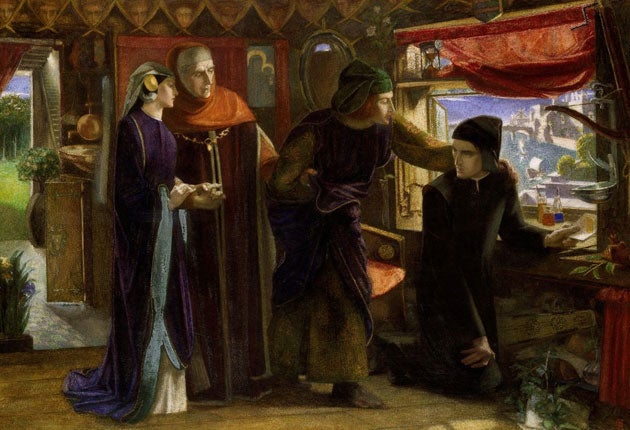The Pre-Raphaelites and Italy, Ashmolean Museum, Oxford
Lovely refit, shame about the paintings

Your support helps us to tell the story
From reproductive rights to climate change to Big Tech, The Independent is on the ground when the story is developing. Whether it's investigating the financials of Elon Musk's pro-Trump PAC or producing our latest documentary, 'The A Word', which shines a light on the American women fighting for reproductive rights, we know how important it is to parse out the facts from the messaging.
At such a critical moment in US history, we need reporters on the ground. Your donation allows us to keep sending journalists to speak to both sides of the story.
The Independent is trusted by Americans across the entire political spectrum. And unlike many other quality news outlets, we choose not to lock Americans out of our reporting and analysis with paywalls. We believe quality journalism should be available to everyone, paid for by those who can afford it.
Your support makes all the difference.This is the first temporary exhibition since the reopening of the newly refurbished Ashmolean Museum. The permanent exhibition areas downstairs are a triumph of museum redesign – seldom has a collection of old artefacts looked and felt quite so appetite-whetting. This huge show of 140 works by the Pre-Raphaelites in the temporary exhibition area up on Floor Three, however, which explores their links with Italy, is decidedly not. The works are only fitfully interesting, and the hang is somewhat drearily predictable – how different this hang feels from the innovative use of space within the main gallery areas. It's all rather sad.
Yet sadder still is the sighting, yet again, of (too) many paintings and drawings by Dante Gabriel Rossetti. In a book published this week, Lucian Freud describes Rossetti's anti-achievements with unerring accuracy. Rossetti is painting's equivalent of bad breath, he remarks. How true this is.
Rossetti, one of the founding members of the Pre-Raphaelite Brotherhood in 1848, was utterly besotted by the idea of Italy – as were all the other painters in this show. His father was an Italian political firebrand, marooned in London. Dante Gabriel was so in love with the idea of Italy – note that word – that he swapped around his first two names so that he should be known to the world as Dante, the great national poet. He translated Dante and throughout his life he painted scenes from Dante, from The Divine Comedy and from the much earlier work La Vita Nuova, in which Italy's national poet tells us of his undying love for Beatrice Portinari, with whom he fell in love when she was nine years old. Many Dante scenes are explored. Not a single one of them convinces us.
What exactly is wrong with Rossetti? It is not merely that he draws and paints badly – which he does. It is that his manner of painting seems to lack authenticity. He lives in a rhapsodic world of literary re-imaginings which never feels or looks credible. His colours shriek at us, his women are like nothing ever quite seen on this earth. The central painting here is called Beata Beatrix, the Blessed Beatrice. It is an unfathomably ghoulish representation of womanhood which reeks of emotional fakery. An entire series of works, all guilty of this same charge, run along one wall of the exhibition. Lizzie Siddal, the wife of William Morris with whom Rossetti had an affair, is usually the sitter. The crimped hair often cascades in rust-coloured ringlets, the lips are exaggeratedly liposuctioned. It is all so passionate, so terrible, so evidently doomed. We feel Rossetti's heart pounding horribly – thud, thud, thud – as he paints his strange world into being, which mingles a curiously heightened brand of quasi-religiosity with sex and death. These are masturbatory dream-portraits. They possess a ghastly, ghostly pallor. Oh dear, oh dear. Unsurprisingly, Dante Gabriel never got round to visiting Italy. Had he done so, it might have proved too disappointingly unrhapsodic to one so febrile.
To 5 December ( www.ashmolean.org)
Join our commenting forum
Join thought-provoking conversations, follow other Independent readers and see their replies
Comments